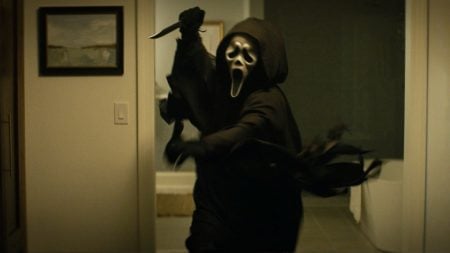“You know how in marriage they say “for better or for worse”? I think, in terms of my life, I have entered the “for worse” part, and it happened so quietly I didn’t even recognize it.” Those are the words of legendary lyricist Lorenz Hart in the film Blue Moon. Hart opines to the bartender at Sardi’s, attempting to keep himself on the wagon, while ruminating on his sorrows of life and love. In a small film with grand ambitions, director Richard Linklater gives us a night in the life of the other half of Rodgers and Hart. A comedy and a tragedy all together, tied in beautiful sympathy with a show-stopping performance by Ethan Hawke.
Blue Moon takes us through one evening in the life of the Broadway songwriter Hart. While the film is not a cradle-to-grave biography, Linklater’s choice to frame the entire story in the lounge at Sardi’s is a stroke of genius. We see Hart on the night of great personal turmoil—the opening of Oklahoma! Rather than taking us through the grind of another biopic, we instead learn we need to know about Hart through the timing of this one particular evening.

Lorenz Hart wallows in his self-pity while teetering on the cusp of falling back into the bottle. He bends the ear of the bartender, Eddie (Bobby Cannavale), and others in the bar, including a struggling writer, E.B. White (Patrick Kennedy). Hart is bitter over having passed up the chance to write and takes a cynical view of his own career. Oklahoma!, despite his cynicism, is going to be a smash hit, and all he can do is think about the past.
The stage is set for a grand party to celebrate the opening night of the play, and Hart is on the periphery. Watching as Oscar Hammerstein and Richard Rodgers enjoy the praise and toasts in their honor, Hawke brings to Hart a quiet jealousy that is hardly contemptible. Hart is a broken man, without love and sadly without purpose. Eccentric to a fault, Hawke gives us a man who is broken, but entirely unvarnished.

There is an interesting contrast in how Hart interacts with both Rodgers and Hammerstein. Even when they are being sincere, Hart comes off as someone who is not putting on airs. Perhaps it is where Hart finds himself, but there is a tender, soulful quality to him. It is almost as if he belongs to a world that no longer exists. Now all he can do is watch the parade march by him.
At the crux of the story is the hopeless romantic. Hart pines his heart away for a Yale student and aspiring production designer named Elizabeth (Margaret Qualley). The two have been pen pals since a weekend in Vermont resulted in an unconsummated love. For Hart, she holds the key to his happiness and possible career revival.
To his credit and perhaps the punishment of those around him, Hart talks a mile a minute. Hart zips from anecdotes to stories of the theater, to the creation of his many songs, like the titular Blue Moon. He is an actor seeking the spotlight. He is like the bride in need of a wedding. Hart wishes to be the center of attention, and yet his current lot in life is the result of his own doing: alcoholism and unreliability.

We learn from his musings and interactions with Richard Rodgers (Andrew Scott) that his creative partnership soured. Rodgers teamed with Oscar Hammerstein (Simon Delaney), forming what would become Rodgers and Hammerstein — the most successful partnership in the history of Broadway. There is jealousy, there is regret, and yes, bewilderment.
The supporting performances are noteworthy, especially Qualley’s. She continues to dominate the screen with her charm and cinematic presence, conjuring memories of the stars of old Hollywood. She reminds us time and again why she is a star who continues to rise and shine. Cannavale as Eddie offers an ear of friendship and brotherly concern to Hart, and has some of the film’s best exchanges. But ultimately, this is Hawke’s show. The curtain rises or falls by his performance — and he brings the house down!

In the span of ninety minutes, and set over the course of a single evening, Linklater paints us a portrait of a down-on-his-luck, past-his-prime, hopeless romantic. At times, the film works as a light comedy, in part thanks to Hawke’s mesmerizing performance. But on the other hand, there is an element of pathos as Hart reckons with unrequited love and creative dullness.
Once again, thank you, Ethan Hawke.
Blue Moon highlights the life and ultimately sad end of a songwriter, not as well known as other giants of Broadway, but who did, in fact, contribute words and lyrics that continue to leave us bewitched, bothered, and bewildered.
Blue Moon is currently playing in theaters courtesy of Sony Pictures Classics.

In a small film with grand ambitions, director Richard Linklater gives us a night in the life of the other half of Rodgers and Hart. A comedy and a tragedy all together, tied in beautiful sympathy with a show-stopping performance by Ethan Hawke.
-
9
-
User Ratings (0 Votes)
0

Writing & podcasting, for the love of movies.
His Letterboxd Favorites: The Dark Knight, Halloween, Jaws & A Christmas Story.






